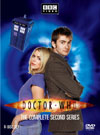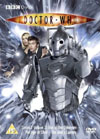DVD Extras (box sets only) include:
We then find Mickey at the center of a very entertaining story beat in the TARDIS control room. Far more charming than the bizarre story the Doctor is telling. Way to go Mick. After a bizarre bit of all-hell breaking loose, and some cool exterior shots of a police box falling through God-knows-what, the TARDIS crashes to a stop. It's a pity the Doctor's so full of explanations hingeing on the less-than-believable loss of Gallifrey. The more unknowns to explore at this point, the better. Sadly, this becomes yet another story that fails to show a proper materialization for the TARDIS (if indeed, we can say that one occurred). We do have better than the usual cheap and cheesy reasons for missing it this time around, but that's all six of David Tennant's first stories that have missed out on this staple effect so far. What are the production crew thinking?
"Set Sail for Great Britain" Down Under!So, where in all of time and space are we today? Yet another story in the long line of those incapable of going anywhere but Earth, and present day England to boot? ...Not quite. We have the two extremely cool additions of Zeppelin air traffic and the otherwise deceased Mr. Pete Tyler helping to establish this as a parallel Earth. This kind of "sliding" has only been acknowledged once before on Doctor Who, in "Inferno" (story no. 54). Getting back to their home universe is quickly identified as one of the major challenges the Doctor and friends will have to face in this adventure. So far so good.But that's not all. If this is the Cybermen's genesis story, and they end up taking over the planet, one begins to wonder if some strange power experiment by the Cybermen won't end up transporting their world into our universe, say back into the year 1986, thus providing the Doctor and friends with their "ride home". That would effectively make this a whole other planet in the Doctor Who universe called "Mondas", complete with its own mythological history, and give a more believable explanation for Mondas having identical continents than what was offered during its initial sighting in "The Tenth Planet" (story no. 29). Now that's a right-on setting. Pre-trans-universal-timewarp Mondas. With Britain on the Southern Hemisphere, and the sun rising over the skyline Rose would know as the "West", and setting in the "East", providing it wasn't the trans-universal timewarp that flipped it upside down and gave it a new, dizzyingly fast rotation in the first place. Mondas... if my latest theory held, which would mean that my previous one about "New Earth" had just been deposed. Oh well, this new one was cooler. If all that stuff wasn't enough, Tom MacRae's writing begins to craft one charismatic scene after another, as our three travellers become consumed with curiosity over their parallel lives, and the story magnetically pulls the viewers into it with them. It's that kind of good writing that makes mere stories that deal with series' mythology into classics. Awesome. Next bonus: Shaun Dingwall returns to give us more of Rose's Dad, Mr. Pete Tyler. Pete gets to shine far stronger in this story now that he's free of the ridiculous plot of "Father's Day" (story no. 167), and he and Camille Coduri as Rose's mum Jackie get to play off of each other wonderfully again. Great stuff. Later TARDIS interior scenes let the show down a bit, being about less-than-believable magic more than anything else. Interestingly, there's a bit on the finished DVD version that was cut out of the CBC broadcast where the Doctor elaborates on travel between parallel worlds, which once again has him mooning over the loss of the Timelords. Utter crap ignoring the most obvious, common, unstoppable method of switching parallel universes ever: choice. And the CBC made a very good choice, if anything absolutely had to be cut for time, in cutting out that bit.
A Tale of Two MickeysOf course Noel Clarke is always immensely enjoyable to watch as Mickey, so giving him a dual role in this story is sweet icing on the cake. Meeting one's double in a parallel universe is one of the staples of the TV series "Sliders" which the Doctor Who story "Inferno" missed out on, so it's great to see it tackled so exuberantly here in "Rise of the Cybermen".Mickey does do very well in this adventure, but take all the "From Zero to Hero" talk with a grain of salt. Mickey has never been "zero" at any time except perhaps near the end of the 2005 pilot episode "Rose" (story no. 161). Never forget who took out all the Slitheen in "Aliens of London" (story no. 164), or who saved the universe with a big yellow truck in "Bad Wolf" (story no. 170), while the ninth Doctor monkeyed around ineffectively. And never forget who rescued the Doctor and friends and a load of hypnotized children from a Krillotane-infested school that was about to explode. Let's face it, this story is just one in a long line of those showing Mickey getting better and better. Kudos must also go to the creation of the character of John Lumic. Good solid humanoid male lead villains had strangely become a rarity on the revived version of Doctor Who, but Roger Lloyd Pack's performance here makes Lumic one of the best the series has ever had. Another ingredient helping to make this a classic story. Colin Spaull also deserves mention for giving a very enjoyable and honest performance as lead henchman Mr. Crane. Good stuff. Of course this story has a top notch director, the first to come from the annals of the classic 1963-1989 series and make the transition to the 2005 revived show. Graeme Harper is once again in fine form here. In fact, while his work on "The Caves of Androzani" (story no. 136) and "Revelation of the Daleks" (story no. 143) was certainly impressive, I was always very disappointed with the content of those particular scripts because they failed to ask for things I actually enjoyed and wanted to see in my favourite program. Harper finally has a script worthy of his talents with "Rise of the Cybermen", and pulls out all the stops to make it glorious - resulting in, I think, his best work yet. Zeppelins. What a beautifully unique touch. I absolutely love the scene where Pete and the President meet Lumic's arriving Zeppelin, firstly for all the wonderful, totally believable visuals speaking of the impressive size and power and industrial grace of such vehicles, and secondly because it is backed by my favourite part of Murray Gold's score.
One bizarre trait that seems to be sneaking into the music lately consists of crescendos of what I can only call "school bells", which usually end rather abruptly. What's up with the overuse of those? Upon first noticing them in "School Reunion", it was easy to dismiss them as a sound effect. But now here we are at posh parties and power plants on a parallel planet, and the kids are still being called back inside after recess. This sound goes too far into jolting the audience out of the moment of the story. Not a good musical sound at all.
Cybermen .2The Cybermen are in for a few upgrades themselves now that they join the revived 2005 version of Doctor Who, and so they first do what they've always loved to do: trade in their costumes. This latest version retains most of the key elements of the traditional Cyberman head, with the biggest change being the large scale de-emphasis of the rings on each side. That's a bit sad, losing a huge chunk of iconic design, but this new version seems to harken back to some of the earlier designs from the 1960's such as found in "The Moonbase" (story no. 33), "The Tomb of the Cybermen" (story no. 37), and "The Wheel in Space" (story no. 43).On the plus side, reason is finally given for the development of the "ear handle" part of the design, very cleverly and subtly too. Nice touch. The whole idea of the mad race to have the latest technological upgrade is an excellent new emphasis for Cyber mythology, which is nicely brought home in this story, literally. Being on Earth, albeit a parallel one, really helps make this idea poignant, so good choice. No complaints about this setting. Other traditional cyber elements suffer a bit though in favour of this new idea. Whatever happened to the gradual limb replacement theory of the original Cybermen from "The Tenth Planet"? As defined in episode two of that story, cybernization was their solution to the shorter life spans suffered by the entire population. Here, only Lumic appears to have medical needs prompting the cybernization process. But one of the biggest disappointments is the process itself, in its shrinking scope and time-scale. I think Cybermen work better when there is more mystery about which parts are organic and which parts are cybernetic replacements. I thought it extremely weird and less plausible that they only want to keep the brain and chuck everything else. Note that this process does not garner a single honestly willing volunteer anywhere in the story, which I think needs to be the case for the genesis on Mondas. There's still a lot to be said for the most organic look the Cybermen have ever had, back in their original appearance in "The Tenth Planet". More importantly, the speed with which people get cybernized in this story is ridiculous. They barely move out of sight into a cybernization chamber, when they magically pop out of their hypnotized state and start screaming. The CGI shots of overhead slice-and-dice machines are the worst offenders, suggesting a combination of overcomplication and uncareful haste that doesn't seem capable of carrying out a successful cyber conversion. Such shots are clearly designed with only an attempt to frighten the viewer in mind. How much better they could have achieved that if they had also taken the time to slow things down to a believable pace. Graeme Harper could have done better still by sending those shot concepts back to the drawing board. Even with all of its other problems, the Colin Baker adventure "Attack of the Cybermen" (story no. 138) still rules in bringing cybernization to the screen - half the trick being wise enough to know what should be left to the imagination. Note the slow speed of the process in that tale, and all the partially complete stages that are shown and agonized over. Also note that the brain does not appear to be the most important organic part in that story's Cybermen, although perhaps it should have been.
The Plot of SteelEpisode One wraps up with a fantastic sequence building up to a cliffhanger moment with no obvious resolution. Awesome. Even more awesome is the fact that the credits roll and complete themselves with no irritating commercial for next week full of spoilers. Excellent! If only all of the new Doctor Who episodes would end like this! Only they would have to come up with a correctly timed version of the theme music, because the edits during this credit sequence, good though they are, are still too obvious and rush past bits that we should expect to hear.Episode Two proceeds with a solid plot that seems to flow organically out of the situation. If anything, there is enough scope and there are enough characters in this particular situation to devote half the season to it. But, the good Doctor is by now too good at stepping up to the plate and unraveling such things to let it last that long. Indeed, the only big drawbacks of this story all fit in the category of wanting more of what was being expertly given to us. More of the humanoid John Lumic would be nice, as he exits the tale a bit too early for my liking, and I was disappointed that he did not get a face-to-face confrontation with David Tennant's Doctor, or perhaps Mickey as well. On the plus side, we learn the origins of the mysterious Cyber Controller, seen in only two previous stories (although there does appear to be a sub-controller in "The Tenth Planet" episode four). They did a really good job setting this character up and getting one of two perfect voices for him (I think Michael Kilgarriff would have been another excellent choice, both for performance and continuity reasons). Let's hope the new Controller manages a return someday. The conclusion turned out different to what I had theorized, but hit all the most important marks for being a success. The Doctor's journey occurs mostly under his own power, and culminates in a previously unexplored space in which to confront the most powerful lead villain. He is immensely clever with his dialogue (all of which makes sense and can be clearly heard unlike "The Shakespeare Code" [story no. 184] ), and the Doctor also gets to perform the final climactic act himself after planning the whole thing in the moment and getting an assist from nearly every other character still on his team. Stupendous! This is Doctor Who the way it should be. Additionally, we have a very natural response from Pete Tyler to the truths that Rose finally lets out in the end, and Shaun Dingwall does the moment proud. Nice stuff. Perhaps the biggest lasting disappointment with the story was the fact that Mickey leaves the TARDIS crew at the end of this adventure. Already? And in a way that suggests we can't ever see him return again? And here I was hoping that he would, thinking he could and should, outlast Rose in his travels on board the TARDIS. Damn. We do at least get to see a good dematerialization of the TARDIS, but unfortunately the previously elaborated complexity of crossing universes is trivialized at this point, and yet another opportunity to show the first on-screen materialization for the police box during the David Tennant era is left out for no good reason. Arrgh.
International Titles:Deutsch: "Die Auferstehung der Cybermen"(but "Attack of the Cybermen" = "Angriff der Kybermänner")
Magyar: "A kiborgok kora"
Français: "Le Règne des Cybermen"
Русский: "Восстание киберлюдей"
Italiano: "L'ascesa dei Cyber-uomini"
This story has become available on DVD. Click on the Amazon symbol for the location nearest you for pricing and availability:
Note: The full season sets contain commentaries, behind-the-scenes featurettes, and other extras. The smaller volumes only feature the plain episodes. Comments on this article are welcome. You may contact the author from this page:
|









